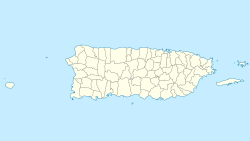The 1918 San Fermín earthquake, also known as the Puerto Rico earthquake of 1918, struck the island of Puerto Rico at on October 11. The earthquake measured 7.1 on the moment magnitude scale and IX (Violent) on the Mercalli intensity scale. The mainshock epicenter occurred off the northwestern coast of the island, somewhere along the Puerto Rico Trench.
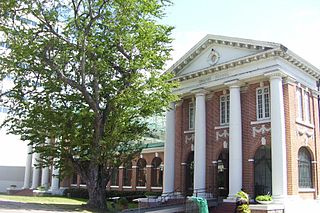
The Puerto Rico Museum of Contemporary Art, often abbreviated to MAC, is a contemporary art museum in Santurce, Puerto Rico.

Mercado de las Carnes, also known as La Plaza de los Perros, but formally, Plaza Juan Ponce de León, was the first building in Puerto Rico to mix social and architectural elements via the pedestrian mall concept. The historic Art Deco architecture structure is located in Ponce, Puerto Rico, and dates from 1926. It was listed on the National Register of Historic Places in 1986. The Plaza was rebuilt in 1992, under the administration of Mayor Churumba. It is located in the alley connecting Mayor and Leon streets, in the block between Estrella and Guadalupe streets. The Plaza and the alley are one and the same.
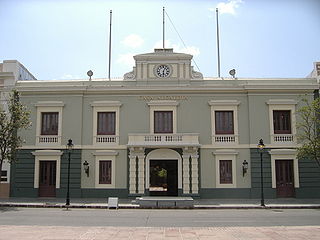
The Ponce City Hall is a historic city hall in Ponce, Puerto Rico. It is located it the center of the city, on Calle Degetau, across from Plaza Degetau in the Ponce Historic Zone. The building serves as the seat of the executive branch of government of the Autonomous Municipality of Ponce, including the office of the mayor of Ponce. Built in 1840, it is the oldest colonial building in the city. The building was listed on the U.S. National Register of Historic Places in 1986 as Casa Alcaldía de Ponce-City Hall.

Barrio Playa, also known as Playa de Ponce, Ponce Playa, or La Playa, is one of the thirty-one barrios that comprise the municipality of Ponce, Puerto Rico. Along with Bucaná, Canas, Vayas, and Capitanejo, Playa is one of the municipality's five coastal barrios. Barrio Playa also incorporates several islands, the largest of which is Caja de Muertos. It was founded in 1831.
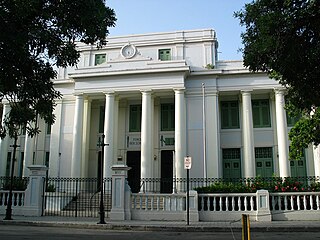
The Ponce High School is public educational institution in Ponce, Puerto Rico, offering grades nine through twelve. The school's main building is a historic structure located on Cristina Street, in the Ponce Historic Zone. From its beginning the school has secured a unique place in Puerto Rico's educational history. Of over 3,000 schools erected in Puerto Rico in the first quarter of the twentieth century, Ponce High was the largest, "at a time enrolling more students than all the other Puerto Rico high schools combined", and for many years enrolling more students than any other high school in Puerto Rico. The cost of the building in 1915 dollars was $150,000 USD. The building was listed on the U.S. National Register of Historic Places on 4 August 1987. The school has the only diamond-level DECA chapter in Puerto Rico. The Ponce High School building is "among the most important public buildings ever built in Puerto Rico." The school is the oldest continuously-operating high school in Puerto Rico.

The Antiguo Cuartel Militar Español de Ponce or El Castillo is the only structure directly related to the events of the land defense of Puerto Rico during the 1898 American invasion of the Island. The historic building dates from 1894 and is located on Calle Castillo in Ponce, Puerto Rico, in the city's historic district. The structure was listed on the U.S. National Register of Historic Places on 14 May 1987.
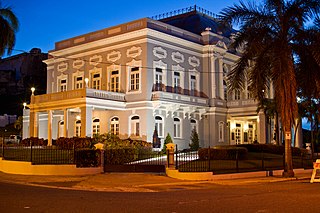
The Antiguo Casino de Puerto Rico, located at Avenida Ponce de León 1 in San Juan, Puerto Rico, is a Beaux Arts architecture style building dating from 1917. It was listed on the National Register of Historic Places in 1977, and on the Puerto Rico Register of Historic Sites and Zones in 2000.

The Ernesto Memorial Chapel, also known as the Iglesia de Piedra and the Iglesia Metodista de Piedra is located in Abra Honda, a rural barrio in Camuy, Puerto Rico. After the Kiplinger family lost their 21-year-old son, Ernesto, they donated money for the building of the church.

The Dr. Martin G. Brumbaugh Graded School is a former school in Santa Isabel Pueblo, Puerto Rico. Built in 1906, it is named for Martin Grove Brumbaugh, the 26th Governor of Pennsylvania and an influential educator who headed Puerto Rico's school programming after the U.S. ousted Spain. The school was added to the National Register of Historic Places (NRHP) in 2011.

The Washington Irving Graded School is a historic school located in Adjuntas Pueblo, the historic and administrative center of the municipality of Adjuntas in central Puerto Rico. The school was named after short-story writer Washington Irving, famous for works such as "Rip Van Winkle" (1819) and "The Legend of Sleepy Hollow" (1820). It was added to the National Register of Historic Places in 2015 due to its historic architectural importance.

The James A. Garfield Graded School is a public elementary school named after the 20th president of the United States, James A. Garfield, located in Guánica, Puerto Rico. The school was added to the United States National Register of Historic Places in 2015.
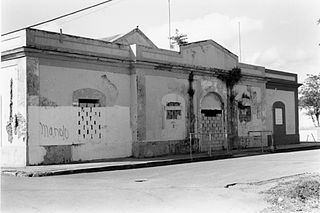
The Old Customs House of Humacao is a historic building located in Punta Santiago, in the municipality of Humacao, Puerto Rico. The structure was designed in the Spanish Colonial style, architecturally and typologically and finished in 1872 by the Department of Public Works of the Spanish Government in Puerto Rico. Until this time, the customs house was a temporary wooden building, so the need for a permanent structure made it possible that, in 1865, it was decided to construct the present building to serve as the new customs house at Punta Santiago.
The Antonia Sáez School is a former school located in Humacao, Puerto Rico. The Mission/Spanish Revival school building was added to the United States National Register of Historic Places in 1995, and to the Puerto Rico Register of Historic Sites and Zones on May 16, 2001. The structure also served as a marketplace between 1966 and 2004.
Luis Muñoz Rivera School is a historic 1926 public school located in Lajas, Puerto Rico. It was added to the United States National Register of Historic Places in 2012.

Eugenio María de Hostos School is a historic early 20th century school located in Las Marías, Puerto Rico.
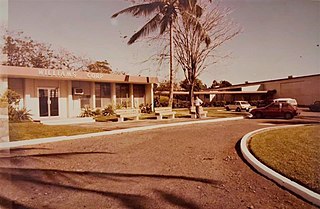
The Williams Products Corporation Factory, popularly referred to as La Williams, is a historic factory building located in the municipality of Luquillo, Puerto Rico. It was added to the United States National Register of Historic Places in 2012.

Brambaugh School, officially the Dr. Martin Grove Brumbaugh School but better known today as Puerta de Tierra Public School, is an early 20th-century historic school building located in the Puerta de Tierra historic district in the city of San Juan, Puerto Rico. The school was built in 1913 by Frank B. Hatch based on designs by architect G.R. Gilmour and named after the first Education Commissioner of Puerto Rico Martin Grove Brumbaugh. It was the first modern school to be built in the Puerta de Tierra area of San Juan Antiguo and, until the construction of the neighboring José Celso Barbosa Graded School, it was the only school in the area. Brambaugh School continues to be an important public education center for the local community today.
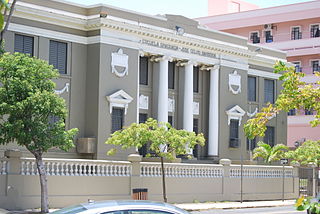
The José Celso Barbosa Graded School is a historic school building located in the Puerta de Tierra historic district in the city of San Juan, Puerto Rico. The school is named after Puerto Rico statehood movement founder Dr. José Celso Barbosa and has been listed in the National Register of Historic Places since 1989, and on the Puerto Rico Register of Historic Sites and Zones since 2000. The school was built between 1924 and 1927 and designed by the firm del Valle & Co. in a Neoclassical-style with the intention of making it a public secondary school for recently graduated students from the nearby Brambaugh School. It forms part of the monumental sequence of buildings and memorials that contribute to the Puerta de Tierra Historic District, which also includes the Capitol of Puerto Rico.

James Fenimore Cooper Graded School is a historic school located in Sabana Grande Pueblo, the administrative and historic center of the municipality of Sabana Grande, Puerto Rico. The school is located across from the main town square and church of Sabana Grande. It was designed by Charles G. Post in the Neoclassical style, popular in the architecture of early 20th-century schoolhouses and built in 1903. It was the first institution to be built in the town of Sabana Grande under the new U.S. colonial administration.
